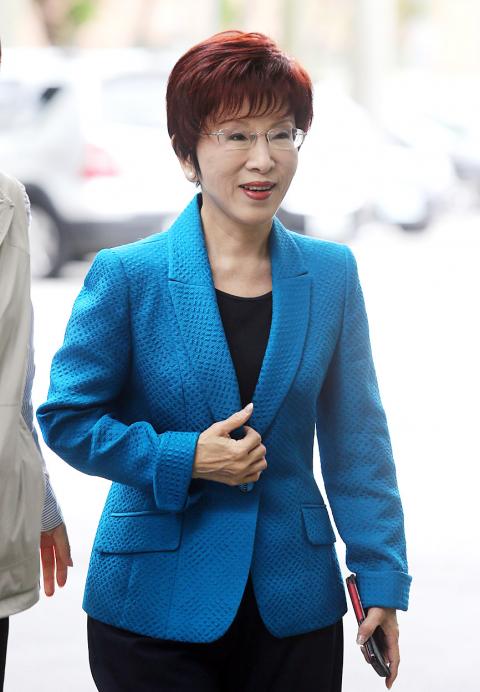Regarding a call for Chinese Nationalist Party (KMT) Chairman Eric Chu (朱立倫) to be “conscripted” to represent the party in next year’s presidential election, Deputy Legislative Speaker Hung Hsiu-chu (洪秀柱), a KMT member who signed up for the party’s primary, yesterday said she would not oppose the move, but only if it is “sufficiently justified.”
As Saturday next week is the last day for potential contenders to sign up for the party’s primary, some KMT members are apparently getting anxious over Chu’s seemingly strong determination to stay out of the race, and it has now been said that Chu might be “drafted” to represent the party.
Saying the process of collecting signatures for her nomination, which is required by KMT primary rules, “could not be better,” Hung yesterday said that she is “okay” with “conscripting” Chu to represent the party, “but only if it is sufficiently justified.”

Photo: CNA
“The party has set up a primary system that could, after much toil, finally demonstrate the party’s resolve to really mean it. If at this point other factors intervene, it would present a bad image to society,” Hung said.
The KMT requires potential candidates to collect signatures from at least 5 percent of all party members, about 15,000, for them to be eligible as candidates on Saturday next week.
Hung said she has acquired the needed amount.
“I reached the threshold simply with the signatures from party members who returned a request for signatures that my team sent out,” Hung said.
However, former health minister Yaung Chih-liang (楊志良), another KMT member who has signed up for the primary, is facing a significant struggle.
“Everybody knows that I do not belong to a [party] faction. If I did, it would be easier [to reach the threshold],” he said, adding that collecting signatures is “not easy,” as, while he might have many KMT-affiliated friends, he does not know as many qualified party members, which, he added, is the same for the Democratic Progressive Party.
He said he has received many signatures, but many of them are not from qualified party members, adding that he might pass the threshold if it were a signature drive open to all.
“I might lose my NT$2 million [US$65,000] deposit if I do not get the 15,000 required signatures,” he said.
Yaung said he would accept the party’s decision to “enlist” Chu if no one passes the signature threshold and if Legislative Speaker Wang Jin-pyng (王金平) decides not to sign up.
“I would abide by the rules of the game,” he said.

The Ministry of Economic Affairs has fined Taobao NT$1.2 million (US$36,912) for advertisements that exceed its approved business scope, requiring the Chinese e-commerce platform to make corrections in the first half of this year or its license may be revoked. Lawmakers have called for stricter enforcement of Chinese e-commerce platforms and measures to prevent China from laundering its goods through Taiwan in response to US President Donald Trump’s heavy tariffs on China. The Legislative Yuan’s Finance Committee met today to discuss policies to prevent China from dumping goods in Taiwan, inviting government agencies to report. Democratic Progressive Party Legislator Kuo Kuo-wen (郭國文) said

The Ministry of Economic Affairs has fined Taobao NT$1.2 million (US$36,900) for advertisements that exceeded its approved business scope and ordered the Chinese e-commerce platform to make corrections in the first half of this year or its license would be revoked. Lawmakers have called for stricter supervision of Chinese e-commerce platforms and more stringent measures to prevent China from laundering its goods through Taiwan as US President Donald Trump’s administration cracks down on origin laundering. The legislature’s Finance Committee yesterday met to discuss policies to prevent China from dumping goods in Taiwan, inviting government agencies to report on the matter. Democratic Progressive Party

Taiwan and its Pacific ally Tuvalu on Tuesday signed two accords aimed at facilitating bilateral cooperation on labor affairs, according to Taiwan’s Ministry of Foreign Affairs (MOFA). The governments inked two agreements in Taipei, witnessed by Foreign Minister Lin Chia-lung (林佳龍) and visiting Deputy Tuvaluan Prime Minister Panapasi Nelesone, MOFA said in a news release. According to MOFA, the agreements will facilitate cooperation on labor issues and allow the two sides to mutually recognize seafarers’ certificates and related training. Taiwan would also continue to collaborate with Tuvalu across various fields to promote economic prosperity as well as the well-being of their

Sung Chien-liang (宋建樑), who led efforts to recall Democratic Progressive Party (DPP) Legislator Lee Kun-cheng (李坤城), was released on bail of NT$80,000 today amid outcry over his decision to wear a Nazi armband to questioning the night before. Sung arrived at the New Taipei District Prosecutors’ Office for questioning in a recall petition forgery case last night wearing a red armband bearing a swastika, carrying a copy of Adolf Hitler’s Mein Kampf and giving a Nazi salute. Sung left the building at 1:15am without the armband and covering the book with his coat. Lee said today that this is a serious